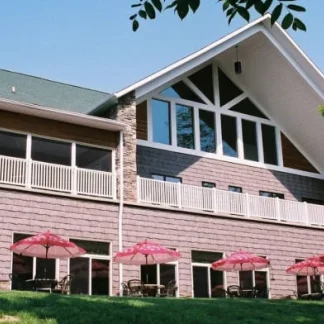Wooded Glen Recovery Center
Henryville, Indiana, 2602 Hebron Church Rd., 47126
Available Programs
- Adult program
- Program for men
- Program for women
- Young adult program
Insurance and Financial
- Self-pay options
- Private insurance
About this Facility
Wooded Glen Recovery Center, located in Henryville, Indiana, is a luxury drug and alcohol rehab for adults. The center specializes in medically supervised detox, intensive inpatient treatment, and aftercare planning and support.
At Wooded Glen Recovery Center, dedicated programs are available for young adults, seniors, military personnel, and Veterans. Treatment is also available for dual diagnosis disorders.
Inpatient Program The residential treatment center allows clients to focus on their recovery in a comfortable, home-like environment. Premium amenities include a rural setting, chef-prepared meals, and on-site fitness and recreational facilities. Clients receive medical and mental health assessments and personalized care planning. Those undergoing detox enjoy around-the-clock medical supervision and may be prescribed FDA-approved medications to ease withdrawal symptoms and prevent potentially serious complications. Clients also engage in intensive, trauma-informed individual, group, and family counseling drawing on proven modalities, including CBT and motivational interviewing. The program promotes clients’ sustained sobriety and successful community reintegration through robust, recovery-focused life-skills training. Topics include coping, self-care, wellness, emotional regulation, and relapse prevention. An array of evidence-based complementary therapies is available, including recreational therapy and experiential therapy.
Outpatient and Aftercare Services Their outpatient and aftercare services ensure a complete continuum of care aligned with clients’ evolving needs. These services may include step-down support, sober living transitions, 12-Step program facilitation, and referrals for medical, mental health, and social service programs.
Accreditation and Payment Wooded Glen Recovery Center is certified by LegitScript and accredited by The Joint Commission. They accept private insurance, military insurance, financing, and self-pay. Financial aid may be available.
Contact us for more information: (888) 202-7226

Contact Wooded Glen Recovery Center
Connect with Wooded Glen Recovery Center by calling their admissions team directly.
(888) 202-7226 Website Get Directions